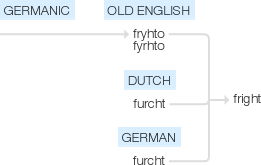Fright
Old English fryhto, fyrhto (noun), of Germanic origin; related to Dutch furcht and German furcht .
wiktionary
From Middle English fright, furht, from Old English fryhtu, fyrhto(“fright, fear, dread, trembling, horrible sight”), from Proto-Germanic *furhtį̄(“fear”), from Proto-Indo-European *pr̥k-(“to fear”).
Cognate with Scots fricht(“fright”), Old Frisian fruchte(“fright”), Low German frucht(“fright”), Middle Dutch vrucht, German Furcht(“fear, fright”), Danish frygt(“fear”), Swedish fruktan(“fear, fright, dread”), Gothic 𐍆𐌰𐌿𐍂𐌷𐍄𐌴𐌹( faurhtei, “fear, horror, fright”). Compare possibly Albanian frikë(“fear, fright, dread, danger”).
Probably short for affright, from Middle English afright, from Old English āfyrht, past participle of āfyrhtan(“to make afraid; terrify”).
etymonline
fright (n.)
Middle English freiht, fright, from Old English (Northumbrian) fryhto, metathesis of Old English fyrhtu "fear, dread, trembling, horrible sight," from Proto-Germanic *furkhtaz "afraid" (source also of Old Saxon forhta, Old Frisian fruchte, Old High German forhta, German Furcht, Gothic faurhtei "fear"). Not etymologically related to the word fear, which superseded it 13c. as the principal word except in cases of sudden terror. For spelling evolution, see fight (v.).
fright (v.)
"to frighten," Middle English, from Old English fyrhtan "to terrify, fill with fear," from the source of fright (n.). Old English also had forhtian "be afraid, become full of fear, tremble," but the primary sense of the verb in Middle English was "to make afraid."
